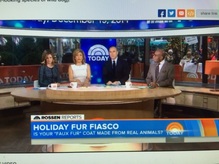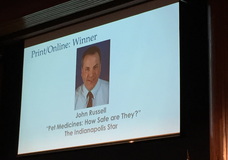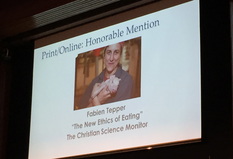2015 National Press Club Ann Cottrell Free Animal Reporting Award Winners

Broadcast:
Winner
A series of reports on the abuse and neglect of animals in the nation’s food chain. -- CNN Investigative correspondent Chris Frates.
In a series of graphic and shocking reports about how animals are treated in agricultural facilities, Chris Frates and his crew traveled to North Carolina, Wisconsin and Minnesota to confront factory farm officials with undercover video that included chickens being buried alive and pigs so sick their intestines were hanging outside of their bodies.
One of the pieces documented how agriculture interests are pushing to outlaw undercover footage in their facilities. The videos from these investigations have led to criminal charges, fines and even the largest meat recall in American history.
Frates went to the floor of the North Carolina Senate to talk to the lawmaker sponsoring his state’s so-called “ag-gag” law, which would make it a crime to record images of conditions in animal agriculture facilities. He also confronted officials at a farm with video of sick pigs. The farm’s veterinarian called the allegations untrue, even before seeing the video. The CNN crew traveled to California to investigate a company that was buying diseased dairy cows and processing them when government inspectors weren’t there. After the cows were killed, employees would hide the warning signs of cancer by trimming off diseased parts, using a fake stamp of approval or even replacing the heads of sick cows with ones from healthy animals.
These stories gained widespread attention, including in Congress, where one member said, “We’ve gotten far more information, frankly, from CNN than we’ve gotten from the USDA and this is completely unacceptable.”
Winner
A series of reports on the abuse and neglect of animals in the nation’s food chain. -- CNN Investigative correspondent Chris Frates.
In a series of graphic and shocking reports about how animals are treated in agricultural facilities, Chris Frates and his crew traveled to North Carolina, Wisconsin and Minnesota to confront factory farm officials with undercover video that included chickens being buried alive and pigs so sick their intestines were hanging outside of their bodies.
One of the pieces documented how agriculture interests are pushing to outlaw undercover footage in their facilities. The videos from these investigations have led to criminal charges, fines and even the largest meat recall in American history.
Frates went to the floor of the North Carolina Senate to talk to the lawmaker sponsoring his state’s so-called “ag-gag” law, which would make it a crime to record images of conditions in animal agriculture facilities. He also confronted officials at a farm with video of sick pigs. The farm’s veterinarian called the allegations untrue, even before seeing the video. The CNN crew traveled to California to investigate a company that was buying diseased dairy cows and processing them when government inspectors weren’t there. After the cows were killed, employees would hide the warning signs of cancer by trimming off diseased parts, using a fake stamp of approval or even replacing the heads of sick cows with ones from healthy animals.
These stories gained widespread attention, including in Congress, where one member said, “We’ve gotten far more information, frankly, from CNN than we’ve gotten from the USDA and this is completely unacceptable.”

Broadcast:
Honorable Mention "Faux Fur" - an NBC News and TODAY Show ‘Rossen Reports’ investigation. -- NBC National Investigative Correspondent Jeff Rossen and Producer Charles McLravy. A several-months long investigation by NBC News revealed that some of the country’s biggest retailers were passing off garments labeled and advertised as containing “faux fur” were actually made from the fur of real animals, including rabbits, coyotes and raccoon dogs. Using hidden and open-cameras, NBC documented how some of the merchandise was misrepresented in stores. The team also worked with an accredited independent lab to determine the origin of the so-called “faux fur.” These hair sample tests found that all of the garments NBC purchased were actually from the fur of real animals. The report drew a strong reaction. Major retailers and suppliers told NBC they would take steps to prevent this from happening again, with one retailer even pulling their entire line of real fur products as well. Label information is important to many consumers. According to a May 2014 Gallup poll, nearly 100 million Americans think buying and wearing fur is “morally wrong.” |
|

Print/Online:
Winner
“Pet Medicines: How Safe are They?” - John Russell, The Indianapolis Star
When the largest company in Indianapolis, pharmaceutical giant Eli Lilly, announced in 2012 that it would aggressively expand its animal-medicine division, the Indianapolis Star decided the time was ripe for an examination of the little-known and lucrative world of these specialty drugs.
In a three part series that was nearly two years in the making, John Russell and the investigations team took an in-depth look at the the multi-billion dollar pet pharmaceutical industry. In their reporting, they found that that veterinarians, researchers and drug companies are free to work closely together, with little to no disclosure of gifts, grants and fees. They also found that animal medicines pose a higher risk of unforeseen side effects than human medicine and a legal arena that offers little protection to pet owners. Their research revealed that drug companies, animal hospitals, pet insurance companies and other major players were resisting efforts by the Food and Drug Administration to share all safety data, unlike the world of human medicine. In particular, they examined FDA and other records and found disturbing and widespread adverse reactions to a flea and heartworm drug for dogs called Trifexis which included seizures, paralysis and death.
Their groundbreaking reporting resulted in calls by veterinarians for reforms as well as Congressional interest in legislation to make drugs safer for animals.
Winner
“Pet Medicines: How Safe are They?” - John Russell, The Indianapolis Star
When the largest company in Indianapolis, pharmaceutical giant Eli Lilly, announced in 2012 that it would aggressively expand its animal-medicine division, the Indianapolis Star decided the time was ripe for an examination of the little-known and lucrative world of these specialty drugs.
In a three part series that was nearly two years in the making, John Russell and the investigations team took an in-depth look at the the multi-billion dollar pet pharmaceutical industry. In their reporting, they found that that veterinarians, researchers and drug companies are free to work closely together, with little to no disclosure of gifts, grants and fees. They also found that animal medicines pose a higher risk of unforeseen side effects than human medicine and a legal arena that offers little protection to pet owners. Their research revealed that drug companies, animal hospitals, pet insurance companies and other major players were resisting efforts by the Food and Drug Administration to share all safety data, unlike the world of human medicine. In particular, they examined FDA and other records and found disturbing and widespread adverse reactions to a flea and heartworm drug for dogs called Trifexis which included seizures, paralysis and death.
Their groundbreaking reporting resulted in calls by veterinarians for reforms as well as Congressional interest in legislation to make drugs safer for animals.

Print/Online:
Honorable Mention
“The New Ethics of Eating: Rising awareness of animal welfare is slowly transforming industrial farming and its cold focus on efficiency.” - Fabien Tepper, The Christian Science Monitor
In a piece that chronicles a meaningful shift in how animals are living and dying on American farms, Fabien Tepper of The Christian Science Monitor, examines how evolving notions of animal sentience and human decency are beginning to change industrial standards of animal welfare.
Tepper spoke to philosophers, activists, scientists, consumers and farmers and visited animal farms and sanctuaries. While plainly describing the the shocking practices that dominate animal agriculture, she tells a story that yields insights into the moral evolution of America’s relationship to farmed animals and what this evolution may mean, in concrete terms, for those animals.
The story was widely republished and discussed. It was also cited in a talk to the New York State Bar Association on how so-called “ag-gag” bills, which make it a crime to record images of conditions in animal agriculture facilities, impact freedom of speech, privacy and animal protection.
Honorable Mention
“The New Ethics of Eating: Rising awareness of animal welfare is slowly transforming industrial farming and its cold focus on efficiency.” - Fabien Tepper, The Christian Science Monitor
In a piece that chronicles a meaningful shift in how animals are living and dying on American farms, Fabien Tepper of The Christian Science Monitor, examines how evolving notions of animal sentience and human decency are beginning to change industrial standards of animal welfare.
Tepper spoke to philosophers, activists, scientists, consumers and farmers and visited animal farms and sanctuaries. While plainly describing the the shocking practices that dominate animal agriculture, she tells a story that yields insights into the moral evolution of America’s relationship to farmed animals and what this evolution may mean, in concrete terms, for those animals.
The story was widely republished and discussed. It was also cited in a talk to the New York State Bar Association on how so-called “ag-gag” bills, which make it a crime to record images of conditions in animal agriculture facilities, impact freedom of speech, privacy and animal protection.
